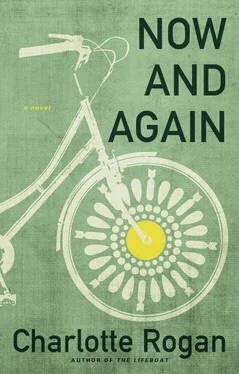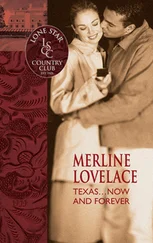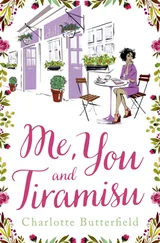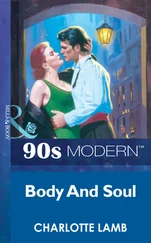There were always pieces missing. There were always girls who thought it funny to conceal a piece of the puzzle up their sleeves so that they could return to the table in the bright light of a July morning, crawl about on all fours, and emerge from underneath the table with a triumphant, “Ah-ha! I found it!” and so be the one to complete the picture while the other girls, who had searched high and low and underneath the table and couches only the evening before, looked on with mounting suspicions about where the piece had been all night. In later years, so many pieces were truly missing, vacuumed up by the August cleaning crew or taken home and forgotten by someone who wanted the last quiet laugh, that it took the fun out of doing the puzzles and eventually they were all forgotten or thrown away.
And, finally, she prayed for herself, but it had become a vague prayer. She didn’t know what to pray for. She prayed to be true to her promise. She prayed for strength. She prayed for hope. Sometimes she prayed for tolerance unless she prayed for intolerance, for she thought it was probably a sin to be tolerant of injustice and evil — if evil existed and wasn’t just a name people plastered on things they didn’t understand or agree with. As she prayed, it occurred to her that prayer was the only thing worth doing, the only truly good thing, because all actions had unintended consequences and because people who acted were always in the gravest danger of being wrong.
But so, of course, were people who prayed. Perhaps it was wrong to pray for particular people or results. Perhaps the only thing she could do was to recite the words in the dusty prayer books that were tucked into the backs of the wooden pews. “Our Father,” she whispered into the cavernous emptiness of the old church. “Lord Jesus, son of God.” Or maybe the only good and true expression was a wordless cry to the heavens, a guttural sound of anguish, or a transcendental and meaningless “Om.”
What was it she had meant to do? She had started off with such purpose, but then gone off track somehow. Tomás was only slightly better off than he had been before, since even if he was approved for a new trial, the process could take years and he could be reconvicted, which was sure to break what was left of his spirit. And she had forgotten all about the toxic munitions — or if she hadn’t really forgotten, she hadn’t done anything with the information that God had trusted her to act on. The answer lay in her soul — she was sure of it, but when she tried to concentrate on the holy places of her innermost being, all was airy and dark, like the empty high-ceilinged church that had lost both its priest and its congregation. Her body ached. Her stomach heaved. Her head and brain were on fire.
A bird flapped loose from the rafters and swooped through the nave. It was Justice, she thought, or Truth. Her mind had wandered from the prayer she had wanted to make, and if the prayer couldn’t even be formulated, how could it be sent? Was a vague feeling of supplication enough, or did she have to find the right words in order to make a connection across the universe to wherever the first principle was hiding? Could she use her own words, or did she have to chant official hymns and formulations? She didn’t know, but just in case, she concentrated on the word “good” and all it contained within it and all it entailed. After trying in vain to keep the letters glued together, she let them go, and she saw that God was inside the letters and that he was talking to her, but he was speaking in August Winslow’s voice.
— Don’t you understand anything? Not that I owe you of all people an explanation. And not that you could understand it even if I did!
Winslow was right. What did she know about the history of the world or the intricacies of the law or the demands of politics or the competing needs of populations? It had been arrogance to think that she could change anything or that any change she might make would be for the better. How could she chart a just and true course when she could not know anything for certain? Causation, correlation, coincidence — how could she, Maggie Rayburn, hope to untangle any of the threads?
— You live in the greatest country on earth, said the voice.
And then it was Sandra Day O’Connor who was before her, dressed in a black robe and sitting in a patch of stained light on her portable dais, smiling benignly, flanked by her smartly dressed clerk and the proprietor of the deli and holding something behind her back and asking Maggie to pick a hand. The trip to Phoenix hadn’t been for nothing after all, and Maggie strained to hear the words that the former justice had come to tell her.
“You came,” Maggie said tentatively. “You came to see me after all.” Her words echoed strangely in the ancient acoustics of the church. Outside the high, translucent windows, the light was fading. Somewhere in the distance, a siren blared, and somewhere close by, the dog stirred. She must have fallen asleep, for everything outside of her and everything within went silent, vacuous, and dark.
All through the night or a succession of nights, the voice called out to her, and whether it was God or August Winslow or the former justice trying to make contact, she clearly heard the word “Om.”
— Om, said the voice, unless it was saying “home.”
She fell back into a deep sleep, and when she finally awoke, clearheaded and hungry, Dino was gone. Even though she searched every corner of the church and then circled the block calling his name, she couldn’t find him. The one good thing she had accomplished had come to nothing after all. Everything was a circle, she could see that, and it both made sense and didn’t make sense that at the end of her journey she would find herself exactly where she had begun.
11.6 Dolly
Lord have mercy,” said Dolly. “This is a mighty fine young man.” She hefted the baby against her shoulder before swaddling him more securely and passing him to the mother, who was smiling tiredly from the bed. “Are you ready for your husband to come back in?” The mother nodded and said she was. Dolly straightened the bedcovers before opening the door to where the woman’s family was waiting in the reception area, with its pretty sheer curtains and comfortably upholstered chairs. “You can come in now,” she said.
It was almost 5:30, but Tula, who was working nearly full time during the summer, had stayed late to help out. She was sitting at the desk, the stethoscope Dolly had given her as a present peeking from the pocket of her smock. When everything was clean and orderly, Dolly turned to Tula. “Even if things don’t work out for Danny and me, I’m saying a prayer for you and Will.”
“So am I,” said Tula. “But something tells me Will and I will be just fine.”
“You will be,” said Dolly. “You absolutely will.” She was remembering the Fourth of July picnic where she had met Danny and how she had known instantly that he was the one.
“We argue a lot, but maybe that’s a good thing,” said Tula.
“I wish Danny would argue,” said Dolly. “He used to go for days without saying a word, although now when I call him, I can hardly shut him up.”
“That’s a good sign,” said Tula. “Talking’s always the first step in the healing process.”
They talked for a little while about how some women could just feel things and how Dolly and Tula were like that themselves. Tula said she could sense a world of possibilities hovering and ready to descend: college, children, a little house of her own — hers and Will’s — all of it waiting for her, all of it one tick in time’s cycle closer to coming true. “I not only get feelings,” said Tula, “but I see honest to goodness signs. Just yesterday I was walking through the apple orchard where Will and I used to meet, and I saw him — he was sitting under a tree, plain as day. There wasn’t anybody there of course, but I saw him. It was his way of telling me he’s coming back.”
Читать дальше












